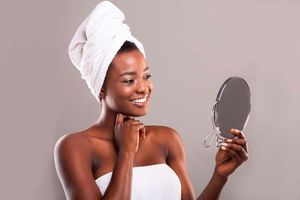Getting rid of pimples: 5 easy tips

Using sunscreen will help protect your skin from further damage which can cause acne.
What you need to know:
- Avoid using harsh chemicals on your skin which can irritate it further.
- Avoid touching or picking pimples. You should also keep your hands away from your face to avoid transferring dirt onto your pores, ultimately leading to acne breakouts.
- Sun exposure dehydrates the skin, leading to dryness and irritation which worsen acne breakouts.
Pimples are a pesky and inconvenient problem. They seem to pop up at the worst time: when you have a big meeting with your boss or a date with your crush. And not only are they unsightly, they can also cause pain and redness. While there is no one-day miracle cure, there are remedies to help the pimples fade faster or minimise the occurrence.
- Aloe Vera gel
Aloe Vera is a natural ingredient that has been used in the treatment of skin conditions such as acne. Aloe Vera contains antibacterial, antiviral, and anti-inflammatory properties, which help reduce inflammation and irritation caused by acne. It also helps to keep the skin moisturised and makes it easier for the other ingredients to penetrate your skin, reducing or even preventing breakouts.
Apply the gel on the affected area once or twice a day. You can even add it to other skin products.
After a week or two, you should notice change on your skin.
Aloe Vera is also available in different forms, such as sprays, cleansers, moisturisers, and creams. Many of these products can be bought over the counter at most pharmacies.
- Use of essential oils
Essential oils are natural ingredients which help to reduce the redness, pain and swelling caused by acne. Essential oils also have antibacterial properties that can kill bacteria that cause acne breakouts.
The most popular essential oil for acne treatment is tea tree oil as it has long been used to treat conditions such as dandruff, scalp infections, and even acne.
To use tea tree oil, mix a few drops with your carrier oil and then apply it on the pimples.
Do a patch test before applying, especially if you have sensitive skin because essential oils might cause irritation or allergies.
Carrier oils such as jojoba oil or olive oil work well with tea tree oil.
You can also use other essential oils such as lavender, cinnamon, or peppermint to treat acne. All these natural ingredients have antibacterial properties which help reduce inflammation caused by acne.
- Witch hazel
Witch hazel works as a natural astringent and helps to dry up excess oil and tighten pores. It also reduces inflammation and irritation caused by acne and speeds up the healing process of pimples
Apply witch hazel on your skin once a day for an effective treatment. Avoid overusing it on your skin, as it may cause dryness and irritation. It is advisable to moisturise your skin after applying witch hazel.
- Pimple treat with green tea
Green tea is a natural antioxidant which helps to reduce redness and inflammation caused by acne. It also has anti-inflammatory properties that help soothe the skin, kill bacteria, and speed up the healing process of pimples.
You can also drink green tea because it contains antioxidants and reduces inflammation from within your body.
You can use green tea bags to make your own solution by mixing with water. Place the mixture in the refrigerator to cool and then apply on your skin.
- Practice skin hygiene
Acne can result from clogged pores and dirt piling up on your skin. Work towards having cleaner, clearer skin by practising good hygiene. Wash your face twice a day with warm water and gentle soap.
Additional tips
Avoid using harsh chemicals on your skin which can irritate it further.
Avoid touching or picking pimples. You should also keep your hands away from your face to avoid transferring dirt onto your pores, ultimately leading to acne breakouts.
Drink lots of water which will keep your skin moisturised and clean. Try to avoid junk food. Instead, eat lots of vegetables and fruits to keep your skin hydrated.
Reduce stress levels in order for the immune system to function well and also get enough sleep.
Using sunscreen will help protect your skin from further damage which can cause acne. Sun exposure also dehydrates the skin, leading to dryness and irritation which worsen acne breakouts. It is best to apply sunscreen every day before going out in the sun for protection against harmful UV rays.
Pimples are a pesky and inconvenient problem. They seem to pop up at the worst time: when you have a big meeting with your boss or a date with your crush. And not only are they unsightly, they can also cause pain and redness. While there is no one-day miracle cure, there are remedies to help the pimples fade faster or minimise the occurrence.
- Aloe Vera gel
Aloe Vera is a natural ingredient that has been used in the treatment of skin conditions such as acne. Aloe Vera contains antibacterial, antiviral, and anti-inflammatory properties, which help reduce inflammation and irritation caused by acne. It also helps to keep the skin moisturised and makes it easier for the other ingredients to penetrate your skin, reducing or even preventing breakouts.
Apply the gel on the affected area once or twice a day. You can even add it to other skin products.
After a week or two, you should notice change on your skin.
Aloe Vera is also available in different forms, such as sprays, cleansers, moisturisers, and creams. Many of these products can be bought over the counter at most pharmacies.
- Use of essential oils
Essential oils are natural ingredients which help to reduce the redness, pain and swelling caused by acne. Essential oils also have antibacterial properties that can kill bacteria that cause acne breakouts.
The most popular essential oil for acne treatment is tea tree oil as it has long been used to treat conditions such as dandruff, scalp infections, and even acne.
To use tea tree oil, mix a few drops with your carrier oil and then apply it on the pimples.
Do a patch test before applying, especially if you have sensitive skin because essential oils might cause irritation or allergies.
Carrier oils such as jojoba oil or olive oil work well with tea tree oil.
You can also use other essential oils such as lavender, cinnamon, or peppermint to treat acne. All these natural ingredients have antibacterial properties which help reduce inflammation caused by acne.
- Witch hazel
Witch hazel works as a natural astringent and helps to dry up excess oil and tighten pores. It also reduces inflammation and irritation caused by acne and speeds up the healing process of pimples
Apply witch hazel on your skin once a day for an effective treatment. Avoid overusing it on your skin, as it may cause dryness and irritation. It is advisable to moisturise your skin after applying witch hazel.
- Pimple treat with green tea
Green tea is a natural antioxidant which helps to reduce redness and inflammation caused by acne. It also has anti-inflammatory properties that help soothe the skin, kill bacteria, and speed up the healing process of pimples.
You can also drink green tea because it contains antioxidants and reduces inflammation from within your body.
You can use green tea bags to make your own solution by mixing with water. Place the mixture in the refrigerator to cool and then apply on your skin.
- Practice skin hygiene
Acne can result from clogged pores and dirt piling up on your skin. Work towards having cleaner, clearer skin by practising good hygiene. Wash your face twice a day with warm water and gentle soap.
Additional tips
Avoid using harsh chemicals on your skin which can irritate it further.
Avoid touching or picking pimples. You should also keep your hands away from your face to avoid transferring dirt onto your pores, ultimately leading to acne breakouts.
Drink lots of water which will keep your skin moisturised and clean. Try to avoid junk food. Instead, eat lots of vegetables and fruits to keep your skin hydrated.
Reduce stress levels in order for the immune system to function well and also get enough sleep.
Using sunscreen will help protect your skin from further damage which can cause acne. Sun exposure also dehydrates the skin, leading to dryness and irritation which worsen acne breakouts. It is best to apply sunscreen every day before going out in the sun for protection against harmful UV rays.




